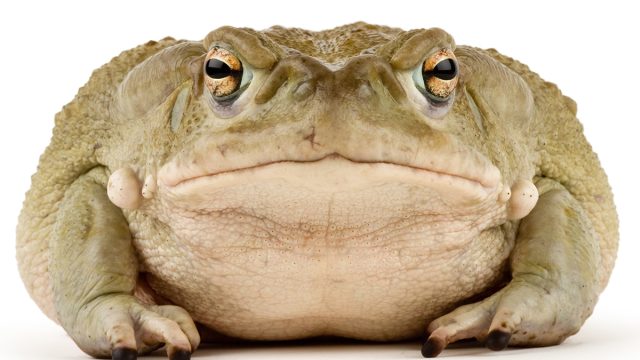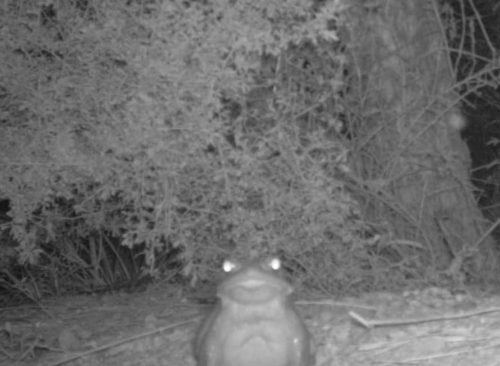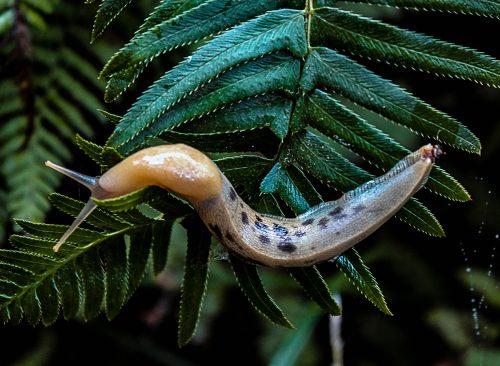National Park Service Asks People to Stop Licking Psychedelic Toads
The pursuit can be dangerous.

If they've said it once, they've said it … well, maybe just this once: the National Park Service has asked visitors to stop licking psychedelic toads. If you weren't aware this was a thing, you are not alone, as social media reaction indicates. The National Park Service issued the warning this week, advising people not to lick the large Sonoran Desert toad because its skin releases a "potent toxin."
Some people do this in an attempt to reach a hallucinogenic high. But the pursuit can be dangerous. The amphibians "have prominent parotoid glands that secrete a potent toxin," the agency warned. "It can make you sick if you handle the frog or get the poison in your mouth." Read on to find out more.

Sonoran Desert toads, also known as Colorado River toads, are some of the largest toads found in North America, measuring 7 inches on average. They are primarily found in the Sonoran desert in the southwestern United States and northwestern Mexico. The amphibians secrete a hallucinogenic substance that has attracted attention in recent years and has led to the National Park Service warning. Historically, the biggest threat to the toads were predators like raccoons. But now they've been targeted by poachers and are threatened by over-harvesting and illegal trafficking, the New York Times reports.

The toads naturally secrete bufotenin, a white milky toxin that protects them from predators. It's also a natural psychedelic known as 5-MeO-DMT. Bufotenin can be snorted, inhaled or smoked and induces a "short but intense psychedelic experience or 'trip' of about 30 minutes, with hallucinogenic effects that are "significantly stronger" than those induced by the primary psychoactive molecule found in the similar substance ayahuasca, the Washington Post reported.
Smoking the toxin—also known as bufo—is a practice that goes back decades, the New York Times says. So can you really get high from licking one? That's a myth, experts say. Doing so can cause dangerous, even fatal, poisoning.

"While it's unclear how many people are wandering through national parks in search of toads, and there is no data to suggest it is widespread, the practice is well known in popular culture and among celebrities," the Washington Post reports. Former boxer Mike Tyson, comedian Chelsea Handler and President Biden's son Hunter Biden have publicly discussed 5-MeO-DMT therapy or toad-venom rituals.

There have been reports of people licking toads in Asia and other countries overseas. It's not clear how many people have tried to do this in America. But British scientist James Rucker, a psychiatrist at King's College London, told the Post he welcomes the warning.
"I imagine the vast majority of people are looking for a cheap psychedelic experience," he said. "I would caution people against it." Bufotenin is one of the psychedelic chemicals scientists are studying for their effect on mental health conditions like depression, said Rucker. "They stir up the mind, and they can induce feelings of euphoria and ecstasy." But they can also induce anxiety, panic, and paranoia.
RELATED: The 10 Most "OMG" Science Discoveries of 2022

The toad is considered endangered in California, where it's illegal to possess bufotenin. In neighboring Arizona, it's legal to own ten of the toads if you have a proper license. (But possessing bufotenin might still get you in trouble with the law.) In any case, if you've attempted to taste one of them, it's better to hold off. "As we say with most things you come across in a national park, whether it be a banana slug, unfamiliar mushroom, or a large toad with glowing eyes in the dead of night, please refrain from licking," the Park Service said. "Thank you."














